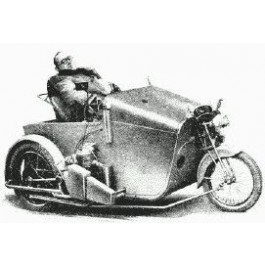The Invacar Ltd (UK) was established in 1948 by Oscar Greeves after having built a 3-wheeler for his paralysed cousin, Derry Preston-Cobb. As a result of the many casualties from the second World War Greeves realised the need for such transport to be widely available. After contacting the government they agreed to pay for the vehicles to be made of which sold in great numbers. These first vehicles were powered by an air cooled Villiers 147cc engine and as well as Invacar other manufacturers also received a contract from the Ministry of Health to produce 3-wheelers. These included Harding Ltd, Dingwall & Son, AC Cars Ltd, Barrett, Tippen & Son, Thundersley and Coventry Climax.
Until the late 1950’s there was no set standard for the vehicle and so many designs appeared ranging from one - two seaters. As a result the Ministry of Health. standardised its requirements which stated that the vehicle was to be powered by a 147cc air cooled Villiers, engine, have a single seat and have steel pressed wheels where by the single front wheel was powered. In addition the vehicle was also to have hydraulic braking and an electric starter all encased by a fibreglass body in Ice Blue. The vehicles were then leased to disabled drivers as part of their disability benefit. The Invacar was modified several times and changes saw Austin Mini wheels being used and a change of engine in the early 1970’s when the Villers engine ceased production. The Invacar was then fitted with a much more powerful 4-stroke 500cc & 600cc Steyr-Puch engine which gave a maximum speed of up to 82 mph. It was the Thundersley Invacar that became the most popular of Invacars as it remained in production until the end of the final DHSS contact in 1977.
It is estimated there were approximately 1,300 Invacars in use around Britain in 2002 but on the 31st March 2003 the vehicles became illegal to own and illegal to drive on the British Highways*. Government service centres were busy crushing around 50 Invacars per month until they no longer existed. A few privately owned examples seemed to have escaped with a few finding their way into museums. The vehicle was replaced by the 4-wheeled, government approved 340cc Canta.
* I have since heard that a number of Invacars are still on the road and it seems to depend on how the vehicle was taxed. Invacars taxed as invalid carriages can no longer be used though those that were classed as tricycles can be.





